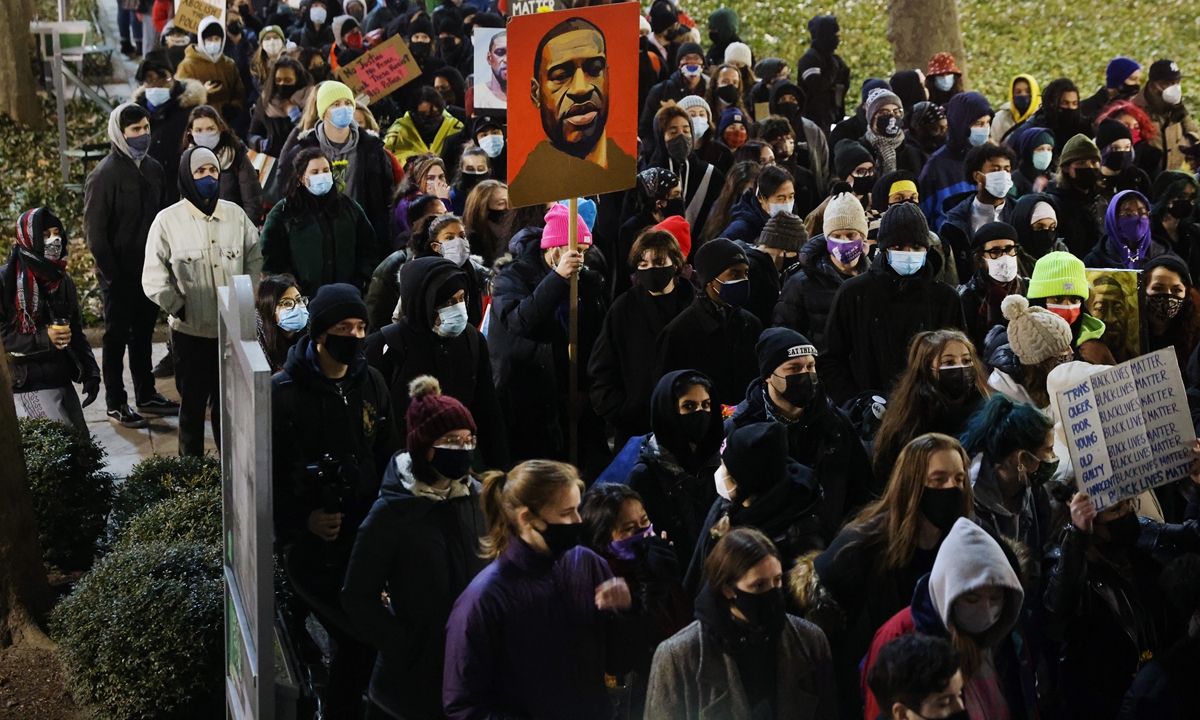
People gather in a Manhattan park to protest on the first day of the trial for the killing of George Floyd last May on March 08, 2021 in New York City. Photo: VCG
There is no problem in pursuing human rights. All countries are free to create a better environment for the realization of human rights. This can be a pursuit just like reducing poverty and achieving sustainable development. However, what we oppose is turning human rights into a tool that serves a specific country's political strategy. In other words, we are not against human rights. Instead, we oppose some countries' multiple standards on the issue and regarding human rights as bargaining chips and chess pieces.The US is a typical example. A case in point: the US Department of State on March 30 released its 2020 Country Reports on Human Rights Practices, in which it focused on criticized human rights situations in countries like China and Russia. The report also claimed that China committed "genocide against Uyghurs" and "crimes against humanity" in Xinjiang. This is a very hostile posture for Washington to take.
The discussion of human rights should be based on facts and truth. However, when it comes to Xinjiang, the US and European countries' discussion is based on lies and rumors. What they claim did not happen in Xinjiang at all. Thus, their conclusion about "genocide" seems ridiculous. Ironically, Washington's tone eases when it comes to the US' own "systemic racism." The US tries to emphasize that its human rights problems are different from those of other countries. Human rights have become a complete double-standard show of the US. The country cannot regard human rights as a moral high ground to serve its hegemony anymore.
What on earth are human rights standards? What is the right thing to do? These are not decided by the US government, or research results by a few pseudo-scholars. Peoples of all countries, including the Americans, should have a say in this.
The biggest problem of the US in terms of human rights is this: America's own poor human rights record is known to all, but Washington refuses to rectify it. It's the US, rather than any other country in the world, that needs to improve human rights.
US Secretary of State Antony Blinken said after the release of the report that, "the Biden-Harris administration will stand against human rights abuses wherever they occur, regardless of whether the perpetrators are adversaries or partners." However, those countries which are often criticized by the US are mainly US' geopolitical targets. Blinken's remarks are very hypocritical. Since Biden served as US vice president, the US human rights and foreign policies have had multiple standards and been a mess, leading to a worrying situation of both human rights and diplomacy.
After the US released the report, Blinken also admitted that the US has "work to do at home, that includes addressing profound inequities, including systemic racism." He called upon the US to confront challenges at home. It's rare that the US admitted its very own human rights problems. But obviously, American politicians have never really realized what on earth their problems are, and have no idea about how to address them. Up until now, improvements are hardly being made, despite Washington vowing to rectify racism many times. Moreover, by saying that, Blinken may believe that by admitting the US' problems, Washington is more qualified to tell other countries what to do.
The problem with the US is that it considers its deeply-rooted human rights problems, such as racism and the gap between rich and poor, as an outlet for its domestic conflicts. When the country did poorly in the COVID-19 fight, demonstrations did not break out. But when George Floyd was brutally killed last May, his death ignited the whole country's anger. These protests against human rights violations are simply an emotional release, rather than a way to solve the problems. In fact, such releases of negative emotions further divide different races in the US.
Washington is trying to dominate human rights affairs in global affairs by going beyond the UN Human Rights Council to set human rights standards for the world. But the US can no longer play the role of a human rights defender. Under such circumstances, the world, especially developing countries, will resist the US' monopoly on the human rights narrative. As a course of consequence, the US' monopoly on what defines human rights will be gradually reduced.
There will be a diversified trend worldwide in terms of the narrative of human rights. The international community will also comprehensively shape a more constructive view of human rights and a governance system related to human rights. This will be an inevitable adjustment and improvement of the original system.
The author is a professor at the School of International Relations and Public Affairs of Fudan University. opinion@globaltimes.com.cn
